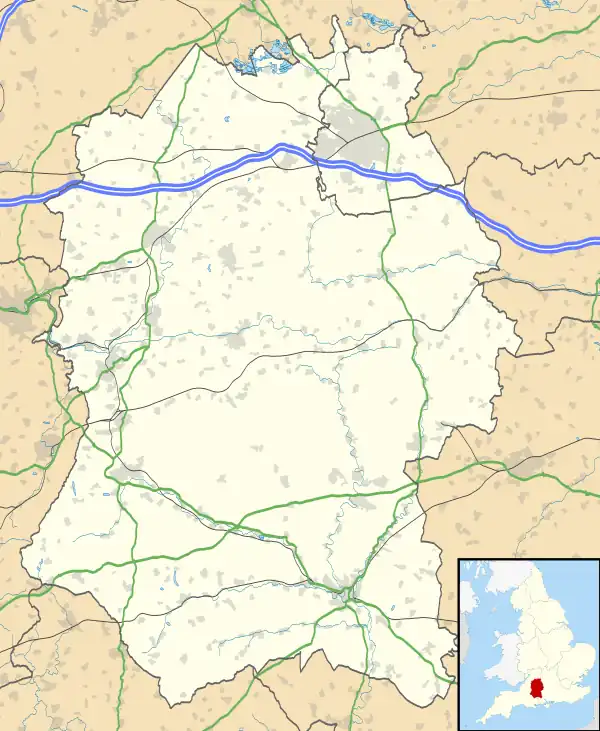| Swinton Barracks | |
|---|---|
| Perham Down | |
 Swinton Barracks | |
 Swinton Barracks Location within Wiltshire | |
| Coordinates | 51°14′20″N 1°37′55″W / 51.239°N 1.632°W |
| Type | Barracks |
| Site information | |
| Owner | Ministry of Defence |
| Operator | |
| Site history | |
| Built | 1915 |
| Built for | War Office |
| In use | 1915–present |
| Garrison information | |
| Occupants | 15 Signal Regiment 22 Engineer Regiment 26 Engineer Regiment |
Swinton Barracks is a military installation accommodating two engineer regiments at Perham Down in Wiltshire, England. The site is on the east edge of Salisbury Plain, about 1+1⁄2 miles (2.4 km) east of the garrison at Tidworth. The camp forms part of the Tidworth, Netheravon and Bulford (TidNBul) Garrison.[1][2]
History
After 2nd London Division held their annual camp at Perham Down in 1914,[3] a hutted army camp was built in the village to provide proper accommodation for the training of large military units.[4]
During the Second World War the barracks were used as a training camp by the 99th Infantry Battalion of the United States Army.[5]
The barracks were rebuilt between 1972 and 1974 and renamed Swinton Barracks at that time.[6][7] 22 Engineer Regiment arrived at the barracks in January 1975[8][9] and were joined by 26 Engineer Regiment.[10] The barracks became a specialist centre for armoured engineering, and its name was chosen to commemorate Major-General Sir Ernest Swinton, who was an early advocate of armoured vehicles and responsible for the recruitment and training of the Tank Detachment in 1916, and, later, Colonel Commandant of the Tank Corps.[11]
Extensive reconstruction at the barracks involving new or refurbished buildings was carried out under Project Allenby Connaught between 2006 and 2014.[12]
Units
The units currently based at the barracks are:[13]
References
- ↑ "Garrison Commander assists with construction of new Officers' Mess". Aspire Defence Limited. 20 December 2017. Retrieved 26 March 2021.
- ↑ at 4:07 pm, Lisa Hartle (7 December 2020). "Royal Signals Celebrates Centenary By Planting 100 Trees". Forces Network. Retrieved 31 August 2021.
{{cite web}}: CS1 maint: numeric names: authors list (link) - ↑ Westlake, Ray (1997). British Battalions in France and Belgium, 1914. Pen and Sword. ISBN 978-0850525779.
- ↑ "Tidworth". Wiltshire Community History. Wiltshire Council. Retrieved 22 May 2020.
- ↑ "Norwegian-Americans and the 99th Infantry Battalion" (PDF). Military Historical Society of Minnesota. p. 2. Retrieved 22 May 2020.
- ↑ "Barracks". Tidworth Town Council. Retrieved 22 May 2020.
- ↑ Baggs, A.P.; Freeman, Jane; Stevenson, Janet H (1995). Crowley, D.A. (ed.). "Victoria County History: Wiltshire: Vol 15 pp153-163 – Parishes: North Tidworth". British History Online. University of London. Retrieved 22 May 2020.
- ↑ "22 Engineer Regiment". British Army Units 1945 On. Retrieved 22 May 2020.
- ↑ "22 Engineer Regiment". British Army. Retrieved 25 May 2020.
- ↑ "26 Engineer Regiment". British Army. Retrieved 25 May 2020.
- ↑ "Who's Who – Sir Ernest Swinton". First World War. Retrieved 4 October 2020.
- ↑ "Army Basing Programme Update" (PDF). Wiltshire Council. Retrieved 22 May 2020.
- ↑ "Order of Battle, Manpower, and Basing Locations". Retrieved 20 November 2020.
- ↑ at 4:07 pm, Lisa Hartle 7 December 2020. "Royal Signals Celebrates Centenary By Planting 100 Trees". Forces Network. Retrieved 31 August 2021.
{{cite web}}: CS1 maint: numeric names: authors list (link)